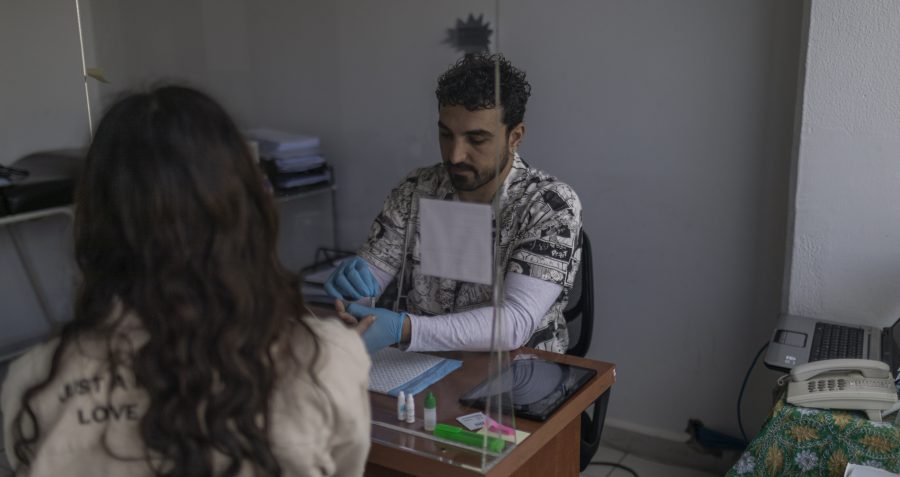Nadoum: delivering impact and change in the MENA region

Between 2019 and 2024, the Nadoum project worked to strengthen the sustainability and quality of HIV services for key populations across the Middle East and North Africa, explains Golda Eid
Nadoum’s mission has always been clear. To strengthen the sustainability and quality of HIV services for key populations across the region. We operate in five countries. Egypt, Jordan, Lebanon, Morocco, and Tunisia.
The MENA (Middle East North Africa) region faces some serious challenges in the fight against HIV. Political sensitivities, underfunding, and stigma have long hindered efforts to provide quality HIV services especially for key populations most affected by the epidemic. If you look at the policies and the law, there is more criminalisation compared to other regions.
It’s the least funded region in the world.
We’ve also had anti-rights movements against LGBQTI communities, and we lived through COVID-19 throughout the implementation phase of this grant. We had the Beirut port explosion, the Morocco earthquake.
Against this background, the Nadoum programme has spent years building relationships and working closely with 23 national and regional partners, including influential regional networks, while engaging governments and international stakeholders. Together, they’re fostering locally led, sustainable HIV responses rooted in community systems strengthening, rights-based programming, and long-term capacity building.
There’s an 85% funding shortfall needed to reach HIV and AIDS targets and combat the epidemic effectively.
MENA has an 85% funding shortfall for HIV response and is the least funded region in the world…receiving less than 1% of the total global HIV funding investment of almost US$19.8 billion.
Source: UNAIDS, quoted in Frontline AIDS’ HIV Prevention and Accountability Report: a multi-country community perspective 2025
Nadoum is very complex. We work in five countries, but we have more than twenty partners, regional and national. We have diverse representation of communities in these other key populations.
We need to highlight that civil society is working in a very hostile world, but they work on advocacy and in a smart and conflict-sensitive way, even if they are targeted by police. Some organisations in the region have been shut down and some programmes were closed, but that didn’t happen to Nadoum or our partners. But it wasn’t easy.
I’m proud of the project and the resilience and adaptation of our civil society organisations in this challenging context. We tried to find innovative solutions to reach key populations. There are so many individual stories of success, I don’t want to diminish others if I highlight one particular success story, but collectively this is huge work that they have done so far.
Nadoum achieved optimal impact across all six Strategic Objectives. The analysis confirms that resources were effectively directed to areas of greatest need, with country-specific adaptations reflecting local contexts and opportunities. Multi-Level Impact: Outcomes span individual behaviour change, institutional policy reform, and systemic transformation.
Source: xxxxxinsertlink when ready
Inaction really is costly. We will continue to work to try to end the epidemic in the region. The spirit of Nadoum is sustainability of services for key populations.
I’m always optimistic because civil society is a resilient, we’ve come a long way and we if we had been pessimistic from the start, we wouldn’t have reached here.
The MENA region has been part of the Frontline Story since 2003
In June 2025, Nadoum was independently evaluated by Singizi Consulting Africa who assessed impact and achievements. six strategic objectives: building the capacity of key population organisations; promoting innovative community-led service models; advocating for increased domestic HIV financing; reducing stigma and legal barriers; documenting and responding to human rights violations using tools like the REAct system; and supporting policy reform for people who use drugs.
They found the project innovative and impactful, highlighting 33 significant outcomes across all six strategic objectives, showing progress at structural, institutional, and behavioural levels. So we want to celebrate this achievement.
Launched in 2019 and running through 2024, Nadoum was a multi-country grant funded by the Global Fund, with the MENA H Coalition as the applicant and Frontline AIDS serving as the Principal Recipient.
As Nadoum’s journey concludes, its achievements lay a strong foundation for the next chapter—MCMENA 3—which will build on this progress to drive even greater impact across the region. With renewed commitment and strengthened partnerships, we look forward to advancing sustainable, community-led HIV responses that leave no one behind. Together, we remain dedicated to the MENA region and to turning hope into lasting change.
Tags
AIDSHIVMiddle East and North Africa (MENA)Nadoum

